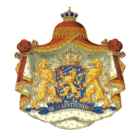Constitution of the Netherlands
|
|
| Monarchy Constitution |
| First Chamber Second Chamber Cabinet |
| Prime Minister |
| Political parties |
| Elections |
The constitution of the Netherlands dates back to 1815, however, the first constitution of the Netherlands (then called the Batavian Republic) was drafted in 1798.
| Contents |
Evolution
Perhaps the most important change was the introduction of ministerial responsibility in 1848, ending the autocratic rule of the king. William II of the Netherlands was increasingly nervous because of the revolts in the rest of Europe, and appointed a state commission headed by Johan Thorbecke to draft the new constitution. This may indeed have prevented a successful uprising, since none followed.
In 1917 universal suffrage for men was introduced, in 1919 also for women.
The last big change of the constitution occurred in 1983. The last, minor, changes were made in 2002.
Contents
The full text can be found at Nederlandse Grondwet.
Chapters
- Basic rights
- Government
- King
- King and ministers
- States-General
- Formation and structure
- Procedures
- Advisory institutions (State Council, General Audit-Office, National Ombudsman and permanent Committees of Advice)
- Law and administration
- Laws and other regulations
- Other provisions
- Administration of justice
- Lower government (provinces, municipalities, polders in charge of a polder board, and other public bodies
- Revision of the constitution
There used to be several additional articles with roman numbering, however all except articles IX and XIX are now abrogated.
Chapter 1 (Basic right) deals with issues such as equality (article 1), the right to vote, freedom of religion, freedom of eduation (article 23), freedom of speech, freedom to meet and protest and the right to privacy.
Statute of the Kingdom
The Kingdom of the Netherlands comprises the Kingdom in Europe, the Netherlands Antilles and Aruba. Where the Dutch constitution is only applicable to the European part of the kingdom, the Statute of the Kingdom of the Netherlands is actually the constitution of the entire Kingdom, valid for all territories.
Constitution vs. other laws
Dutch judges may not test the validity of other laws against the constitution. As a consequence, The Netherlands do not have a Constitutional Court. The idea is that changes to the law should be made by politicians, since they have a mandate from the people.
International treaties on the other hand may overrule Dutch law, even the constitution, and judges are allowed to test laws against them.
Amending the constitution
To amend the constitution, the proposed changes must first be approved by both the Lower and the Upper house of the States-General with a common majority of 50% + one vote. Then parliament must be dissolved and general elections held. After that the proposed changes to the constitution are discussed a second time in both houses of parliament, this time needing a 2/3 majority to approve them. In theory this gives voters a say in the matter. In practice, the election is put off until the end of a normal election term, by which time the proposed changes are ususally snowed under by the political vagaries of the daynl:Nederlandse Grondwet

